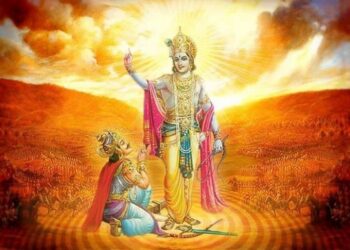TEXT 11
kāyena manasā buddhyā
kevalair indriyair api
yoginaḥ karma kurvanti
saṅgaṁ tyaktvātma-śuddhaye
SYNONYMS
kāyena—with the body; manasā—with the mind; buddhyā—with the intelligence; kevalaiḥ—purified; indriyaiḥ—with the senses; api—even; yoginaḥ—Kṛṣṇa conscious persons; karma—actions; kurvanti—they perform; saṅgam—attachment; tyaktvā—giving up; ātma—of the self; śuddhaye—for the purpose of purification.
TRANSLATION
The yogīs, abandoning attachment, act with body, mind, intelligence and even with the senses, only for the purpose of purification.
PURPORT
When one acts in Kṛṣṇa consciousness for the satisfaction of the senses of Kṛṣṇa, any action, whether of the body, mind, intelligence or even the senses, is purified of material contamination. There are no material reactions resulting from the activities of a Kṛṣṇa conscious person. Therefore purified activities, which are generally called sad-ācāra, can be easily performed by acting in Kṛṣṇa consciousness. Śrī Rūpa Gosvāmī in his Bhakti-rasāmṛta-sindhu (1.2.187) describes this as follows:
īhā yasya harer dāsye
karmaṇā manasā girā
nikhilāsv apy avasthāsu
jīvan-muktaḥ sa ucyate
“A person acting in Kṛṣṇa consciousness (or, in other words, in the service of Kṛṣṇa) with his body, mind, intelligence and words is a liberated person even within the material world, although he may be engaged in many so-called material activities.” He has no false ego, for he does not believe that he is this material body, or that he possesses the body. He knows that he is not this body and that this body does not belong to him. He himself belongs to Kṛṣṇa, and the body too belongs to Kṛṣṇa. When he applies everything produced of the body, mind, intelligence, words, life, wealth, etc.—whatever he may have within his possession—to Kṛṣṇa’s service, he is at once dovetailed with Kṛṣṇa. He is one with Kṛṣṇa and is devoid of the false ego that leads one to believe that he is the body, etc. This is the perfect stage of Kṛṣṇa consciousness.
TEXT 12
yuktaḥ karma-phalaṁ tyaktvā
śāntim āpnoti naiṣṭhikīm
ayuktaḥ kāma-kāreṇa
phale sakto nibadhyate
SYNONYMS
yuktaḥ—one who is engaged in devotional service; karma-phalam—the results of all activities; tyaktvā—giving up; śāntim—perfect peace; āpnoti—achieves; naiṣṭhikīm—unflinching; ayuktaḥ—one who is not in Kṛṣṇa consciousness; kāma-kāreṇa—for enjoying the result of work; phale—in the result; saktaḥ—attached; nibadhyate—becomes entangled.
TRANSLATION
The steadily devoted soul attains unadulterated peace because he offers the result of all activities to Me; whereas a person who is not in union with the Divine, who is greedy for the fruits of his labor, becomes entangled.
PURPORT
The difference between a person in Kṛṣṇa consciousness and a person in bodily consciousness is that the former is attached to Kṛṣṇa whereas the latter is attached to the results of his activities. The person who is attached to Kṛṣṇa and works for Him only is certainly a liberated person, and he has no anxiety over the results of his work. In the Bhāgavatam, the cause of anxiety over the result of an activity is explained as being one’s functioning in the conception of duality, that is, without knowledge of the Absolute Truth. Kṛṣṇa is the Supreme Absolute Truth, the Personality of Godhead. In Kṛṣṇa consciousness, there is no duality. All that exists is a product of Kṛṣṇa’s energy, and Kṛṣṇa is all good. Therefore, activities in Kṛṣṇa consciousness are on the absolute plane; they are transcendental and have no material effect. One is therefore filled with peace in Kṛṣṇa consciousness. But one who is entangled in profit calculation for sense gratification cannot have that peace. This is the secret of Kṛṣṇa consciousness-realization that there is no existence besides Kṛṣṇa is the platform of peace and fearlessness.




















